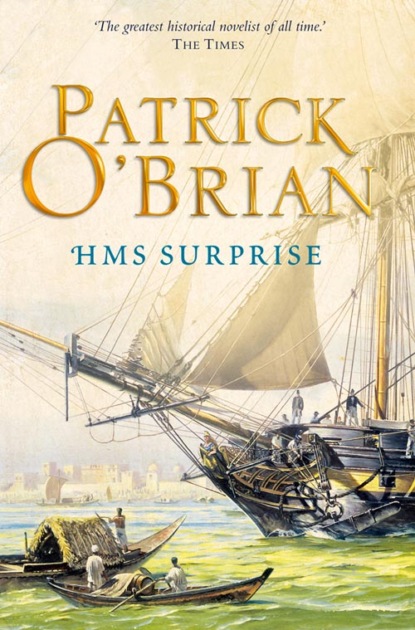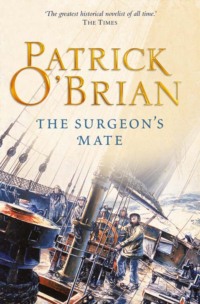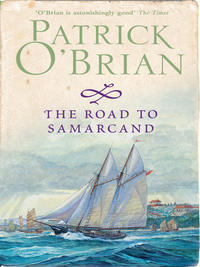
Полная версия
Treason’s Harbour
Mrs Fielding was well placed for the gathering of intelligence: not only was she very widely received, but to eke out her minute income she gave Italian lessons to officers’ wives and daughters and sometimes to officers themselves, and this brought her acquainted with a good many pieces of more or less confidential information, each in itself trifling enough, but each helping to build up a valuable picture of the situation. In spite of her poverty she also gave musical parties, offering her guests lemonade from the prolific tree in her own courtyard and one Naples biscuit apiece; and this added to her value from Lesueur’s point of view, for she played the piano and a beautiful mandoline, sang quite well, and gathered all the more talented naval and military amateurs in a singularly relaxed and unguarded atmosphere. Yet he had not made anything like full use of her potentialities until now, preferring to let her get thoroughly used to the notion that her husband’s welfare depended on her diligence. Lesueur might have told Giuseppe all this without any particular harm, but he was a man as close and reserved as his face, and he liked keeping information to himself – all information. Yet on the other hand Giuseppe, who had been away for a great while, had to have some knowledge of the present situation: he also had to be humoured to a certain degree. ‘She teaches Italian,’ said Lesueur grudgingly, and paused. ‘You see the big man in the arbour on the far left?’
‘The one-armed commander in a scratch-wig?’
‘No. At the other end of the table.’
‘The great fat yellow-haired post-captain with that sparkling thing in his hat?’
‘Just so. He is very fond of the opera.’
‘That red-faced ox of a man? You astonish me. I should have thought beer and skittles more his line. Look how he laughs. They must surely hear him in Ricasoli. He is probably drunk: the English are perpetually drunk – do not know decency.’
‘Perhaps so. At all events he is very fond of the opera. In passing, let me caution you against letting your dislike cloud your judgement, and against underestimating your enemy: the red-faced ox is Captain Aubrey, and although he may not look very wise at present he is the man who negotiated with Sciahan Bey, destroyed Mustapha, and turned us out of Marga. No fool could have done any one of those things, let alone all three. But as I was about to say, being here for some time and being fond of the opera, he decided to have Italian lessons so that he might understand what was going on.’ Giuseppe was about to make some remark on the simplicity of this notion, but seeing the look on Lesueur’s face he closed his mouth. ‘His first teacher was old Ambrogio, but as soon as Carlos heard of this he sent proper people to tell Ambrogio to fall sick and to recommend Mrs Fielding. Let us have no interruptions, I beg,’ he said, holding up his hand as Giuseppe’s mouth opened again. ‘She is already twelve minutes overdue and I wish to say all that I have to say before she comes. The whole point is this: Aubrey and Maturin are close friends; they have always sailed together; and by bringing the woman into contact with Aubrey I bring her into contact with Maturin. She is young, good-looking, quite intelligent, and of good reputation – no known lovers at all. No lovers since her marriage, that is to say. In these circumstances I have little doubt of his becoming involved with her, and I look forward to some very valuable information indeed.’
As Lesueur said these words, Maturin turned in his seat and looked straight at the Apothecary’s Tower: it was exactly as though his strange pale eyes pierced the slatted shutters to the men within and they both silently fell back a pace. ‘A nasty looking crocodile,’ said Giuseppe, in little more than a whisper.
Stephen Maturin’s general uneasiness had been increased by the sense of being stared at, but this had scarcely reached the fully conscious level: his intelligence had not caught up with his instinct and although his eyes were correctly focused his mind was considering the tower as a possible haunt of bats. He knew that since the departure of the Knights its lower part had served as a merchant’s warehouse, but the top was almost certainly unused: a more suitable place could hardly be imagined. Clusius had dealt with the island’s flora at great length, and Pozzo di Borgo with the birds; but the Maltese bats had been most pitifully neglected.
Yet although Dr Maturin was devoted to bats, and to natural philosophy in general, it was only the surface of his mind that was concerned with them at present. The healing cigar had taken off some of his more peevish discontent, but he was still deeply disturbed. As Lesueur had said, he was an intelligence-agent as well as a naval surgeon, and on his return to Malta from the Ionian he had found the already worrying situation more worrying still. Not only was confidential information bandied about in the most reckless way, so that a Sicilian wine-merchant of his acquaintance could tell him, quite correctly, that the 73rd Regiment would leave Gibraltar next week, bound for Cerigo and Santa Maura, but far more important plans were being conveyed, at least in part, to Toulon and Paris.
There had been a most unfortunate vacation of power. In Valletta itself the popular naval governor, a man who had fought with the Maltese against the French, a man who liked the people, knew their leaders intimately well, and spoke their language had, against all reason, been replaced by a soldier, and a stupid arrogant booby of a soldier at that, who publicly referred to the Maltese as a pack of Popish natives who should be made to understand who was master. The French could not have asked for better: they already had intelligence networks in the island and now they reinforced them with money and men, recruiting the dissatisfied in surprising numbers.
But even more important was the interval between the death of Admiral Sir John Thornton and the appointment of a new Commander-in-Chief. Sir John had been a good chief of intelligence as well as an outstanding diplomat, strategist and seaman, yet by far the greater part of his improvised organization was unofficial, based upon personal contact, and it had fallen to pieces in the incompetent hands of his second-in-command and temporary successor, Rear-Admiral Harte: men of substance, often important officials in governments from one end of the Mediterranean to the other, would trust themselves to Sir John or his secretary, but they had nothing to say to an ill-tempered, indiscreet, ignorant stop-gap. Maturin himself, whose services in this respect were wholly voluntary, he being moved by nothing but an intense hatred of the Napoleonic tyranny, had declined to appear in any character other than that of a surgeon while Harte held the command.
This period was now at an end, however: Sir Francis Ives, the new and respectable Commander-in-Chief, was now with the main body of the fleet, blockading Toulon, where the French, with twenty-one line-of-battle ships and seven frigates, showed signs of great activity, while at the same time he was picking up all the complex threads of his command, tactical, strategic, and political, with their necessary complement of intelligence. At the same time the Admiralty was sending an official to deal with the situation in Malta, their acting Second Secretary, no less, Mr Andrew Wray. He had a reputation for brilliant parts, and he had certainly done very well at the Treasury under his cousin Lord Pelham: there was no doubt that he was an exceptionally able man. And Maturin had no doubt that quite apart from coping with the French he would need all his abilities to overcome the ill-will of the Army and the jealousy and obstruction of the other British intelligence organizations that had made their devious way into the island. There were mysterious gentlemen from various departments, darkening counsel, hampering one another, and causing confusion; and Stephen Maturin’s only consolation when he contemplated the situation was that the French were probably worse. Despotic government tends to breed spies and informers, and there were traces of at least three different Paris ministries at work in Malta, each in ignorance of the others, with a man from a fourth keeping watch on them all. The ostensible purpose of Mr Wray’s visit was to check corruption in the dockyard, and it appeared to Maturin that he would probably be more successful in this than in counter-espionage. Intelligence was a highly specialized concern, and as far as he knew this was Wray’s first direct connection with the department. Corruption on the other hand was universal, open to all; and since Wray in his youth had kept a carriage and a considerable establishment on an official salary of a few hundred a year and no private means it was likely that he was tolerably well acquainted with the subject. Maturin had first met Wray some years ago, when Jack Aubrey was ashore, uncommonly rich in prize-money and the spoils of the Mauritius campaign: the meeting – a casual exchange of bows and how d’ye do, sirs – had taken place in a gambling club in Portsmouth, where Jack was playing with several acquaintances. The introduction amounted to nothing in itself and Maturin would never have remembered Wray but for the fact that some days later, when Maturin was in London, it seemed that Jack had accused Wray or his associates, in terms only just ambiguous enough for decency, of cheating at cards. Wray did not ask for the barbarous satisfaction usual in such cases. It is possible that he understood Jack’s words to apply to some other player – Stephen had had no first-hand account of the affair – yet there had been signs of hostile influence inside the Admiralty for some time past: ships refused, good appointments going to men with a far less spectacular fighting-record, no promotion for Jack’s subordinates, and at one time Stephen had suspected that Wray might be taking his revenge in this way. But on the other hand it might be the result of other causes; it might for example be the result of the ministers’ dislike of General Aubrey, Jack’s father, an everlasting member of parliament in the Radical interest and a sad trial to them all – an explanation supported by the fact that Wray’s reputation had not suffered. Ordinarily a man who did not fight in such circumstances was put to the hiss of the world, but when Aubrey and Maturin, who had had to sail very shortly after the unpleasantness, came back from the Indies and beyond Stephen found that it was generally assumed that there had been either a meeting or an explanation, and that Wray was received everywhere: Stephen saw him several times in London. And if Wray had not suffered in reputation he could hardly feel lastingly revengeful. In any case his manner of life had changed entirely since those days: he had made a very good marriage, from a worldly point of view, and although Fanny Harte brought him little beauty and less affection (she was against the match from the start, being attached to William Babbington, of the Royal Navy), her fortune allowed him to lead the expensive life he liked, to lead it without recourse to expedients, and to look forward to a much greater degree of wealth when the Rear-Admiral died, since Harte had inherited an extraordinarily large sum from a money-lending relative in Lombard Street, and Fanny was his only child. Furthermore, after Jack Aubrey’s brilliant and very publicly acknowledged little victory in the Ionian where among other things he had provided the Navy with an excellent base and had delighted the Grand Turk, a point of great diplomatic importance at this juncture, he was reasonably safe from the insidious marginal comment hinting at misconduct or the semi-official note bringing up the indiscretions of his youth.
‘Here is the other one,’ said Lesueur, as Graham came out of the green shade and sat by Stephen Maturin. ‘There were confusing reports about him, and at one time he seemed to be part of a different organization altogether; but now it appears that he is only a linguist, employed to deal with Turkish and Arabic documents, and that he must soon go back to his university. You will have him watched, however, and his connections noted. Where that woman can be I cannot tell. She was supposed to be here twenty-three, no, twenty-four minutes ago, to give Aubrey his lesson. Now she will not have time before his meeting.’
A long pause, and Giuseppe, who had the corner shutter to peer through as well as that which gave the frontal view, said, ‘There is a lady hurrying down the side-alley with a maid.’
‘Has she a dog? A great enormous Illyrian mastiff ?’
‘No, sir, she has not.’
‘Then it is not Mrs Fielding,’ said Lesueur in a cross, positive voice. But he was mistaken, as he perceived the moment the lady and her black-cowled maid turned the corner and hurried into the court of Searle’s hotel.
All the men at Aubrey’s table sprang to their feet, for this was not an example of local solace, no fifth gardener: far from it. Indeed, when Captain Pelham fell flat on his face it would hardly have been an exaggerated testimony of his respect if it had been voluntary, instead of too much Marsala and an inconvenient chair-leg.
There was an amiable hubbub as Mrs Fielding tried to apologize to Captain Aubrey and at the same time to satisfy those officers who wished to know how she did, and what had happened to Ponto. This was the grim censorious puritanical unsmiling creature with a collar of steel spikes, the Illyrian mastiff, an animal the size of a moderate calf that always stalked by Laura Fielding’s side, holding in its long stride to match her shorter step and protecting her from the least familiarity by its mere presence; or if that were not enough then by a thunderous growl. As far as it could be made out, Ponto had been left at home in disgrace for killing an ass; he was perfectly capable of doing so, but Mrs Fielding’s English was sometimes a little wild and the calmness with which she spoke of the act made it seem that there was some mistake. ‘Upon my word, gentlemen,’ she went on, with scarcely a pause, ‘you are all very fine today. White breeches! Silk stockings!’
Why, yes, they said. Had she not heard? Calliope had brought Mr Wray of the Admiralty last night, and they were going to pay their respects at the Governor’s in twenty minutes, square-rigged and with a vast expenditure of breeches-ball and hair-powder, confident that their collective beauty would strike him dumb with amazement.
It was pleasant to see how the captains, some of them true tartars aboard, most of them thoroughly accustomed to battle, and all of them capable of assuming great responsibility, played the fool before a pretty woman. ‘There is a capital book to be written on the human mating display in all its ludicrous variety,’ observed Dr Maturin. ‘Not, however, that this is more than a faint shadowing-forth of the full ceremony. Here we have no strong rivalry, no burning eagerness among the men, no real hope’ – this with a penetrating glance at his friend Aubrey – ‘and in any event the lady is not at leisure.’ Mrs Fielding was certainly not at leisure in Maturin’s particular sense of the word, but it was pleasant too to see how well she took their open though respectful admiration, their kindly banter and their flights of wit – no missishness, no bridling, no simpering, but no bold over-confidence either: she hit just the right note of friendliness, and Maturin watched her with admiration. He had earlier noticed her ignoring of Pelham’s drunkenness – she was used to men of war – and now he observed her instant recovery from the shock of seeing Pullings’ face as Jack Aubrey led him out of the arbour’s shade to be presented and the particularly kind way in which she wished him joy of his promotion and asked him to her house that evening – a very small party, just to hear the rehearsal of a quartet: he saw her childish delight when the chelengk was put through its paces and her frank greed when she had it in her hands and she was admiring the big stones at the top. He watched her with curiosity, and with something more than that. For one thing she reminded him strongly of his first love: she had the same build, rather small but as slim and straight as a rush, and the same striking dark red hair; and by a very singular coincidence she too had arranged it so that a touchingly elegant nape was to be seen, and an ear with a delicate curve. For another she had shown him particular attention.
Insects might still delude Maturin and pierce his skin, but at this late stage it was difficult for women to do so. He knew that no one could possibly admire him for his looks; he had no illusions about his social charms or his conversation; and although he felt that his best books, Remarks on Pezophaps Solitarius and Modest Proposals for the Preservation of Health in the Navy, were not without merit he did not believe that either would set any female bosom in a blaze. Even his wife had not been able to get through more than a few pages, in spite of her very real good will. His status in the Navy was modest – he was not even a commissioned officer – and he had neither patronage nor influence. Nor was he rich.
Mrs Fielding’s amiability and her invitations were therefore prompted by something other than a notion (however remote) of gallantry or of profit: what it might be he could not tell unless indeed it had to do with intelligence. If that were so then clearly it was his duty to be all compliance. There was no other way in which he could sift the matter; no other way in which he could either surprise her connections or induce her to reveal them, or use her to convey false information. He might be completely mistaken – after a while an intelligence-agent tended to see spies everywhere, rather as certain lunatics saw references to themselves in every newspaper – but whether or no he intended to play his part in the hypothetical game. And he the more easily persuaded himself that this was the right course since he liked her company, liked her musical evenings, and was convinced that he could govern any untimely emotion that might rise in his heart. It was for Mrs Fielding that he had put on these white stockings (for neither his rank nor his inclination required his presence at the reception), and it was for Mrs Fielding that he now advanced, swept off his hat, made his most courtly leg and cried, ‘A very good day to you, ma’am. I trust I find you well?’
‘All the better for seeing you, sir,’ said she, smiling and giving him her hand. ‘Dear Doctor, cannot you persuade Captain Aubrey to take his lesson? We only have to memorate the trapassato remoto.’
‘Alas, he is a sailor; and you know the sailor’s slavish devotion to clocks and bells.’
A shadow passed over Laura Fielding’s face: her only disagreement with her husband had been on the subject of punctuality. With a slightly artificial cheerfulness she went on, ‘Just the regular trapassato remoto – not ten minutes.’
‘Look,’ said Stephen, pointing to the clock in the Apothecary’s Tower. They all turned, and once again the watchers involuntarily recoiled. ‘Ten minutes is all these fine gentlemen have in which to pace stately to the Governor’s; for they must not pelt up the cruel slope, creasing their careful neckcloths, losing their hair-powder, gasping in the heat, and arriving in a state of crimson dissolution. You had much better sit down with me and drink a glass of iced cow’s milk in the shade; the goat I cannot recommend.’
‘I dare not,’ she said, as the captains took their leave, walking off in order of seniority, ‘I should be late for Miss Lumley. Captain Aubrey,’ she called, ‘if by any chance I should be delayed for this evening’s rehearsal, I beg you will step in and show Captain Pullings the lemon-tree – it has been watered today! Giovanna is going to Notabile directly, but the door will not be really shut.’
‘I should be very happy to show Captain Pullings the lemon-tree,’ said Jack, and at the word captain Pullings laughed aloud once more. ‘It is the finest lemon-tree of my acquaintance. And pray, ma’am, will Ponto be going to Notabile too?’
‘No. Last time he killed some goats and childs. But he knows the naval uniform. He will not say anything to you, unless perhaps you touch the lemons.’
‘Your plan seems to answer, sir,’ said Giuseppe, watching the officers and Graham start climbing the steps towards the palace and Stephen and Mrs Fielding sit down to a dish of iced cream flavoured with coffee – they had agreed that Miss Lumley was not a sea-officer and could not therefore have so morbidly acute a sense of measured time.
‘I believe it may answer very well,’ said Lesueur. ‘In general I have found that the uglier the man, the greater his vanity.’
‘Now, sir,’ said Laura Fielding, licking her spoon, ‘since you have been so very kind, and since I should like to send Giovanna off to Notabile, I shall ask you to be kinder still and walk with me as far as St Publius: there are always a great many blackguard soldiers hanging about the Porta Reale, and without my dog…’
Dr Maturin declared that he should be happy to act as vicar to so noble a creature, and indeed he looked unusually pleased and cheerful as they left the courtyard and as he handed her across the Piazza Regina, crowded with soldiers and two separate herds of goats; but by the time they were walking past the Auberge de Castile part of his mind had drifted away, back to the subject of mood and its origins. Another part was very much in the present, however, and his silence was in some degree deliberate; it did not last long, but as he had foreseen it disturbed Laura Fielding. She was under a constraint – a constraint that he perceived more and more clearly – and both her tone and her smile were somewhat artificial when she said, ‘Do you like dogs?’
‘Dogs, is it?’ he said, giving her a sideways glance and smiling. ‘Why now, if you were an ordinary commonplace everyday civilly-prating gentlewoman I should smirk and say “Lord, ma’am, I dote upon ’em,” with as graceful a writhe of my person as I could manage. But since it is you I shall only observe that I understand your words as a request that I should say something: you might equally have asked did I like men, or women, or even cats, serpents, bats.’
‘Not bats,’ cried Mrs Fielding.
‘Certainly bats,’ said Dr Maturin. ‘There is as much variety in them as in other creatures: I have known some very high-spirited, cheerful bats, others sullen, froward, dogged, morose. And of course the same applies to dogs – there is the whole gamut from false fawning yellow curs to the heroic Ponto.’
‘Dear Ponto,’ said Mrs Fielding. ‘He is a great comfort to me; but I wish he were a little wiser. My father had a Maremma dog, a bog-dog, that could multiply and divide.’
‘Yet,’ said Maturin, pursuing his own thought, ‘there is a quality in dogs, I must confess, rarely to be seen elsewhere and that is affection: I do not mean the violent possessive protective love for their owner but rather that mild, steady attachment to their friends that we see quite often in the best sort of dog. And when you consider the rarity of plain disinterested affection among our own kind, once we are adult, alas – when you consider how immensely it enhances daily life and how it enriches a man’s past and future, so that he can look back and forward with complacency – why, it is a pleasure to find it in brute creation.’
Affection was also to be found in commanders: it fairly beamed from Pullings as Jack Aubrey led him up to the Governor and his guest. Jack did not at all relish this meeting with Wray, but since he felt that he could not avoid it without meanness he was glad that etiquette required that he should present his former lieutenant: the necessary formality would take away some of the awkwardness. Not that there seemed a great deal of awkwardness ahead, he reflected, looking along the line. Wray looked much the same, a tall, good-looking, animated, gentlemanlike fellow wearing a black coat with a couple of foreign orders; he was perfectly well aware of Jack’s approach – their eyes had met some time before – but he was laughing away with Sir Hildebrand and a red-faced civilian, apparently quite unmoved, as though he had not the least reason to look furtive, or even uneasy in his mind.
The line moved on. It was their turn. Jack made the presentation to the Governor, who replied with a slight inclination of his head, an indifferent look, and the word ‘Happy’. Then he urged Pullings on a step and said, ‘Sir, allow me to name Captain Pullings. Captain Pullings, Mr Secretary Wray.’











